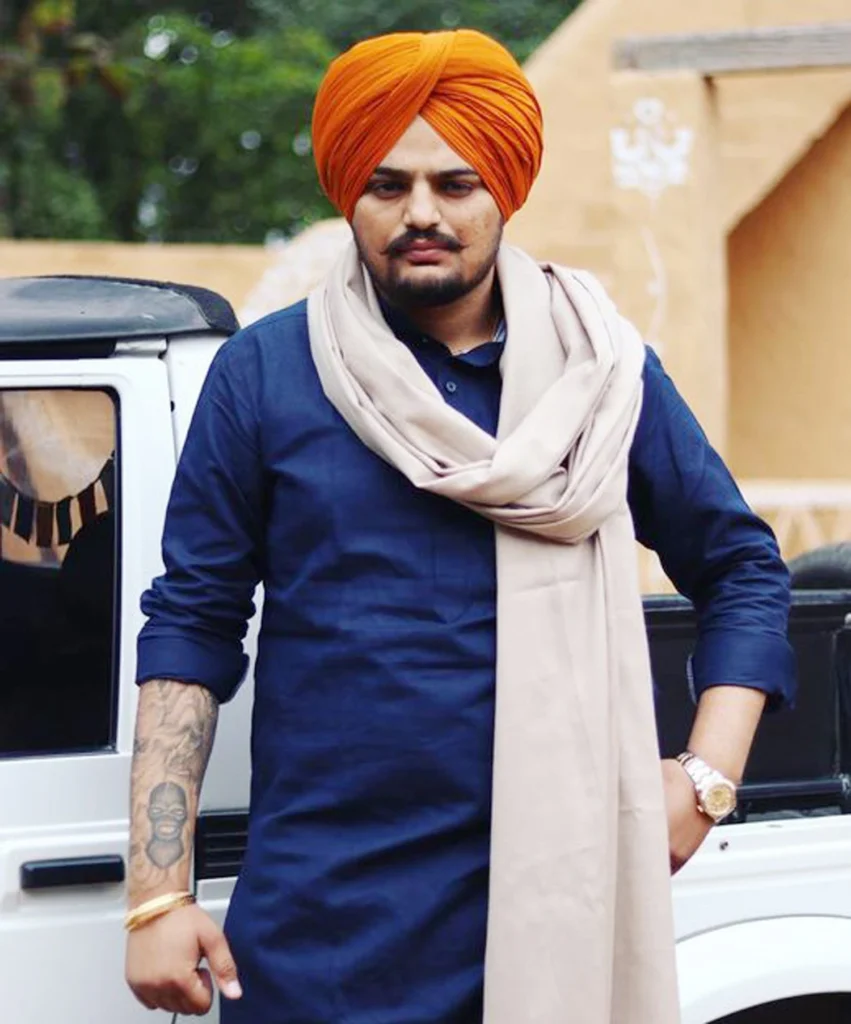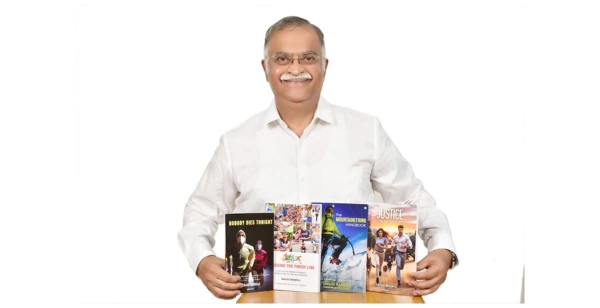
SIDHU MOOSE WALA STILL RUNS THE MUSICAL LANDSCAPE AND PUBLIC MEMORY ONE YEAR LATER.
A DAY AFTER THE PUNJAB GOVERNMENT REDUCED HIS SECURITY COVER, DETAILS OF WHICH WERE MADE PUBLIC, SIDHU MOOSE WALA WAS SHOT DEAD AT PUNJAB’S JAWAHARKE VILLAGE OF MANSA DISTRICT ON MAY 29 LAST YEAR.

Har passe har than, mera na mera na. Lagge paye aa billboard, har galli har mod. There Jatt da ni tod (It’s my name; it’s my name in every way and place), I feel like a god. My name is on billboards on every street and corner. I feel invincible; no one can stand a chance against me.
These are the lyrics to Sidhu Moose Wala’s final song, which was performed by Nigerian singer Burna Boy and published posthumously on April 7 of this year. The song describes the singer-rapper’s enormous global recognition, his devoted followers’ constant mention of his name, and how he can be seen everywhere on billboards and murals.
Posthumous music sales reach millions of views.
His influence and significance are evident from the song’s million views in just 15 minutes. The singer-rapper was assassinated on May 29 of last year in the Punjabi village of Jawaharke in the Mansa district, one day after the Punjab government cut his security cover, the specifics of which were made public.
Also Read and Described: Sidhu Moosewala: Who Was He?
Posthumously, three of Moose Wala’s songs have been made available. The other two, SYL and Vaar, a song about the Sikh warrior Hari Singh Nalwa, have generated debate. While the song SYL, about the riparian conflict between Punjab and Haryana, was taken down from YouTube, a segment of the Muslim community took issue with the song Hari Singh Nalwa due to a reference to “Muhammad” in it. In his famous song 295, Moose Wala acknowledged that controversy was nothing new and noted that “every day a new controversy would be created and there would be debates in the name of religion.” As an artist, progress and success

On June 11, 1993, Shubhdeep Singh Sidhu, also known as Sidhu Moose Wala, was born into a farming family in Mansa’s Moosa hamlet. He proudly displayed his caste (Jatt) identity by assuming the name Moose Wala, which means someone from the Moosa hamlet, and the surname Sidhu.
Moose Wala’s meteoric ascension was unimaginable, as his song “So High,” which was published in 2017, nearly overnight captured the attention of the general public. With the help of music producer Byg Byrd, a song with the lyrics “sir unto langan fly kar ke, ucchiyaan neh gallon tere yaar diyan” went viral and was played nonstop on CDs and in cars.
Although G Waggon, a duet, was not Moose Wala’s debut song, he gained enormous success because of the song “So High,” which he co-wrote with Gurlez Akhtar and which was produced by Deep Jandu. After his passing, old footage of Moose Wala playing at his college festival has received millions of views, and it is unclear how a shy, unassuming lad with a plain appearance rose to such fame.
A few years before he became well-known, he made an appearance in an episode of the popular show “Canteeni Mandeer” while he was a student at Guru Nanak Dev Engineering College. He introduced himself to the anchor as Shubhdeep Sidhu and told him that his debut song, “Licence,” had just been released and was performed by Ninja. He next displayed a portion of his singing, to the enthusiastic ovation of the other college audience members.
Nobody, however, could have imagined that Moose Wala would later go on to establish an entirely new genre of Punjabi music over the course of the following few years. His ability to connect with the audience through a mixture of rustic Punjabi and English expressed in an informal manner is what sets his songs apart from others. controversy surrounding song lyrics and claims that they glorify gun culture
Many of his songs sparked debate among Punjab’s ‘panthic’ religious leaders. In his song Jatti Jeonay Morh Di Bandook Wargi, he referred to the Sikh fighter Mai Bhago of the 18th century, which angered the Shiromani Akali Dal, which even called for his imprisonment. After being charged under the Arms Act for discharging an AK-47, he compared himself to Bollywood star Sanjay Dutt in the song “Sanju,” which was released in July 2020.
His song Panjab (My Motherland), with lyrics like “keh keh ke badle lainda menu,” is dedicated to the farmers’ protest. Aa Panjab kehnde. In “Delhi vi napp Linda, menu Panjab kehnde aa,” Punjab was depicted as a province striving for its rights versus Delhi’s oppression. It was attacked for catering to the separatist (Khalistan) ideology in the video, including Jarnail Singh Bhindranwale’s images. “Misinterpreted and demonised”
People close to the musician claim that he was misunderstood, despite the singer’s repeated accusations that his songs glorified criminals and gun culture. They contend that his songs don’t adequately capture his personality.
Sam Malhi, a DOP who cooperated on seven videos of Moose Wala like US and GOAT alongside music director Sukh Sanghera, revealed some pleasant memories of their time together. “Moose Wala was among the most trustworthy people I’ve ever encountered. Despite being such a well-known figure in the industry, he never acted like a movie star and always treated people with respect. I believe this is the reason there was such a global outpouring of mourning following his passing. People identified with his persona as much as his tunes, according to Malhi.
He believes that Moose Wala’s passing leaves a significant void in the Punjabi music scene that will never be filled by another artist. “No one else could have brought Punjabi music to a global level the way Moose Wala did. I have no doubt that he would have worked with Drake if he were still alive today. He worked with musicians from the UK. Like Tion Wayne and Stefflon Don, it wasn’t a small accomplishment. To film the music video for their song, Burna Boy travelled to his village. It was therefore obvious that other worldwide artists appreciated his genius, according to Malhi.
Read The Ballad of Sidhu. Moose Wala: The Temperamental, Self-Made Man from Moosa as Well Malhi also revealed to Moose Wala that they had an unpublished song and video, but out of respect for their wants, he has now given it up to them to decide when to release it.
Moose Wala’s co-star in his debut movie, “Yes, I am Student,” Mandy Takhar, a British-born actress, recalled him as a “grounded and rooted person who loved Punjab, music, and his parents more than anything.”
She stated, “He dreamed of bringing Punjabi music to international platforms,” in a conversation with The Indian Express. Many people could not do what he did in just five years in the profession. He was one of the best lyricists the profession has ever seen and has exceptional skills. witnessed. I’m happy we collaborated on She described how he was quiet and reserved on set but that, over the course of the shooting days, they developed a comfort level.
preferred for his tunes to speak for him. The way Moose Wala responded to controversies in his songs revealed another side of him. Vijay Singla of the AAP defeated Moose Wala in the Punjab Vidhan Sabha elections, where Moose Wala was running for the incumbent Congress party. Moose Wala received more than 36,000 votes but fell short by more than 63,000. Given that the Aam Aadmi Party defeated the Congress by winning 92 seats and stripping it of its majority in the 117-member assembly, his defeat wasn’t particularly embarrassing.
After losing the Punjab Assembly elections, he released a song in which he attacked AAP. But following the election setback, Moose Wala responded to his loss in the expected manner by producing a song named “Scapegoat.” In the song, he referred to those who did not support his party as traitors to the community and even mentioned Bibi Khalra (Paramjit Kaur Khalra, the wife of Jaswant Singh Khalra, who ran for the Lok Sabha as a member of the Punjabi Ekta Party) and Simranjit Singh Mann (a sitting member of the Lok Sabha from Sangrur).




